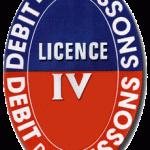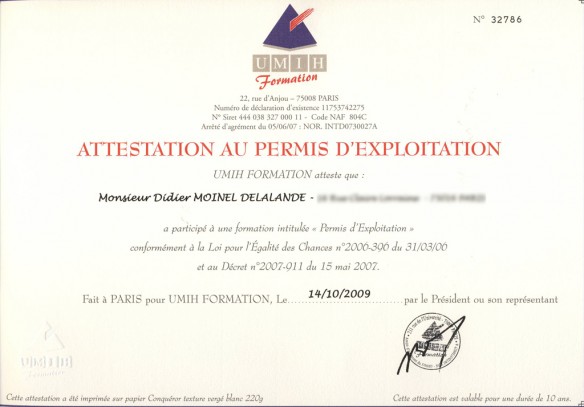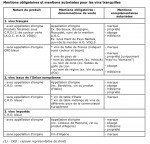Il y a 2 semaines, j’ai abandonné l’hôtel 3 jours durant pour suivre une formation.
 Depuis le 2 avril 2007, la loi a institué une formation pour tout futur titulaire de licence de débits de boissons (licence II, III ou IV), de la « petite licence restaurant » (PR) ou encore de la « licence restaurant » (GR). Cette formation est obligatoire à l’occasion de l’ouverture, la mutation, la translation ou le transfert d’une licence de débit de boissons (licence II,III ou IV) ou de la déclaration de l’ouverture d’un établissement pourvu de la « petite licence restaurant » ou de la « licence restaurant ».
Depuis le 2 avril 2007, la loi a institué une formation pour tout futur titulaire de licence de débits de boissons (licence II, III ou IV), de la « petite licence restaurant » (PR) ou encore de la « licence restaurant » (GR). Cette formation est obligatoire à l’occasion de l’ouverture, la mutation, la translation ou le transfert d’une licence de débit de boissons (licence II,III ou IV) ou de la déclaration de l’ouverture d’un établissement pourvu de la « petite licence restaurant » ou de la « licence restaurant ».
Le but de cette formation est de rappeler les tenants et les aboutissants de notre profession en ce qui concerne la gestion d’un point de vente ou l’alcool est en vente. Le rappel s’effectue aux niveaux de la prévention et la lutte contre l’alcoolisme, l’ivresse publique, la protection des mineurs, la législation sur les stupéfiants, la revente du tabac, la lutte contre le bruit, les faits susceptibles, d’entraîner une fermeture administrative, la responsabilité civile et pénale.
Ce permis d’exploiter possède une durée de vie de 10 ans. Il est renouvelable en suivant une formation plus courte, d’une journée. A la fin d’une formation de 3 jours on nous remet une attestation personnelle de permis d’exploitation (aux couleurs de l’UMIH, l’Union des Métiers et des Industries de l’Hôtellerie).
Ce que j’en pense
Tout d’abord, je trouve cette formation trop longue ; Deux jours suffiraient largement. D’autre part , elle est obligatoirement dispensée par des organismes dépendant exclusivement de syndicats professionnels nationaux représentatifs du secteur Cafés, Hôtels, Restaurants, Discothèques (CHRD) leur offrant une tribune qui, pour ma part, n’a pas manqué de m’énerver : un chapitre entier consacré à nous expliquer le pourquoi du comment du fonctionnement du syndicat, et des avantages à adhérer …
Enfin, je trouve anormal que cette formation obligatoire soit payante (840 euros pour 3 jours,) alors que les démarches administratives (hors achat) d’une licence sont totalement gratuites.
Licenses and permits…
Two weeks ago, I abandoned the hotel for 3 days to follow a training course.
Since the 2nd of April 2007, the law stipulates that anyone wishing to obtain a license to sell drinks to the public (called a license II, III or IV), a ‘small restaurant’ license (PR) or a ‘restaurant license’ (GR) must follow a training course. This course is obligatory when seeking, transforming, or transferring a drinks license (II, III or IV) or when opening an establishment holding a PR or GR license.
The purpose of this course is to remind professionals of the obligations connected with managing an outlet selling alcohol. It focuses on the prevention of alcoholism, public inebriation, underage drinking, legislation regarding drugs, sale of tobacco, and noise prevention, all of which could lead to the establishment being closed down and civil and penal sanctions.
The resulting ‘permis d’exploiter’ (operating permit) is valid for 10 years. It can then be renewed by following a shorter, 1-day training course. So, at the end of the 3-day course you are given a personal certificate of the permit issued by the Hotel Trade and Industry Union (UMIH).
What I think
First of all, I found this course too long. Two days would have been ample. Secondly, it is dispensed by organisms depending exclusively on the national professional syndicates representing the sector of Cafés, Hotels, Restaurants, and Discotheques (CHRD), offering them a platform which, personally, really annoyed me. For example, an entire chapter of the course was devoted to telling us the whys and wherefores of how a syndicate works and the advantages of joining, etc.
Finally, I think that it is wrong that we should have to pay for this obligatory training course (840 Euros for the 3 days,) when the administrative procedures (apart from the purchase) of a license are totally free.
Didier MOINEL DELALANDE










2 commentaires pour “Le Permis d’Exploitation …”